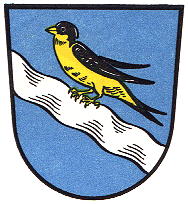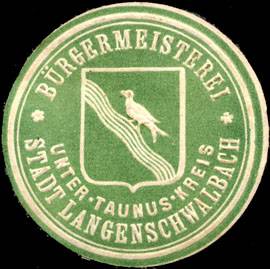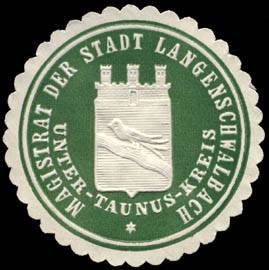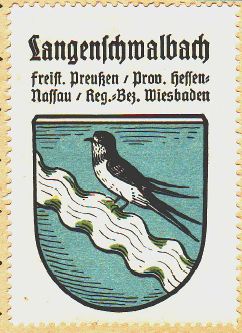Bad Schwalbach: Difference between revisions
Knorrepoes (talk | contribs) m (Text replace - "The arms in the Kaffee Hag albums +/- 1925 " to "The arms by Hupp in the Kaffee Hag albums +/- 1925 ") |
Knorrepoes (talk | contribs) m (Text replace - "{|width="100%" style="color:black; background-color:#ffffcc;" |width="15%"|50 px|left |width="70%" align="center" |'''Heraldry of the World<br/>Civic heraldry of Germany - [[Deutsche Wappen|Deutsche Wappen (Gemeind) |
||
| Line 1: | Line 1: | ||
{ | {{de}} | ||
'''BAD SCHWALBACH (until 1927 Langenschwalbach)''' | '''BAD SCHWALBACH (until 1927 Langenschwalbach)''' | ||
Revision as of 09:22, 25 January 2015
This page is part of the German heraldry portal |
Heraldry of the World |
|
German heraldry:
|
Selected collector's items from Germany:
|
BAD SCHWALBACH (until 1927 Langenschwalbach)
State : Hessen
District (Kreis) : Rheingau-Taunus Kreis (until 1977 Untertaunuskreis)
Additions : 1972 Adolfseck, Fischbach, Heimbach, Hettenhain, Langenseifen, Ramschied; 1977 Lindschied
Origin/meaning
The arms are canting, showing a swallow (Schwalbe) and a river (Bach).
The arms were (re-)designed in 1905 and granted in 1906. However, the design is actually much older; the oldest known use of a swallow and river dates from the early 16th century.
The oldest known seal dates from 1514 and shows the shield in front of a throne with the H. Mary and Child. Similar designs were shown on two later seals, from 1648 and 1736. In the 19th century seals in most cases the shield is shown without the patron saint of the town. The design was also used in many ornaments in the city as well as in (official) paperwork and books. The first use of the colours dates from the 17th century, where the shield is silver, the swallow black and the bend blue. In the 19th century the above colours became the most widely used combination. The swallow was nearly always shown silver, only in the early 20th century it became golden.
Hupp also showed the swallow still in natural colours im the 1920s, see image below.
| Seal from around 1900 |
Seal from around 1900 |
The arms by Hupp in the Kaffee Hag albums +/- 1925 |
Contact and Support
Partners:
Your logo here ?
Contact us
© since 1995, Heraldry of the World, Ralf Hartemink 
Index of the site
Literature : Stadler, 1964-1971, 8 volumes.















